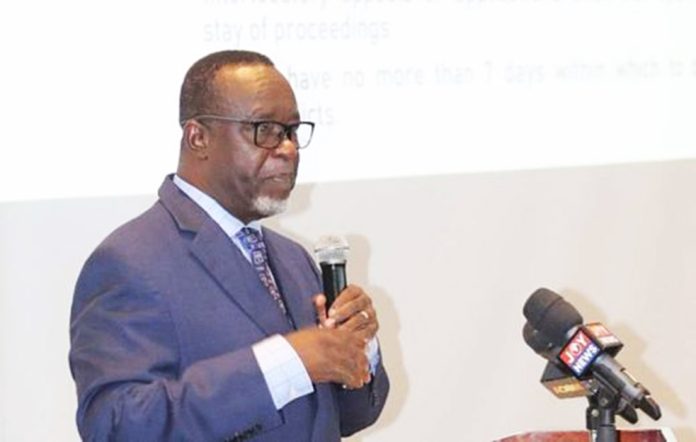Acting Chief Justice Paul Baffoe Bonnie has cautioned judges and magistrates against the misuse of painkillers, warning that the growing culture of self-medication among members of the bench poses serious health risks.
He was speaking at the 44th Annual Conference of the Association of Magistrates and Judges of Ghana (AMJG) dubbed “Leveraging technology to enhance justice delivery” in Accra.
Justice Baffoe Bonnie disclosed that many judicial officers rely heavily on over-the-counter drugs such as diclofenac and ibuprofen to cope with work pressures.
“Most of us as judges and magistrates are used to quick-fix drugs so that we get our business going. These drugs are often misused and abused, frequently taken without prescriptions, in high doses or over prolonged periods. The health risks include stomach ulcers, internal bleeding, kidney damage, liver damage, heart attack, and stroke,” he warned.
He urged judges to serve as moral compasses in addressing pressing national issues such as drug abuse, illegal mining, and environmental degradation.
According to him, while the judiciary is not a policymaking institution, its role in upholding the law and ensuring fairness is critical to tackling these problems.
“We must ensure that prosecutions related to illegal mining and drug trafficking are handled with seriousness and urgency. No person, regardless of political affiliation or social status, should be immune from justice,” he stressed.
The Acting Chief Justice further called for consistency in sentencing to counter public perceptions that punishments for environmental and drug-related crimes are too lenient or inconsistently applied.
He also announced plans to refine and expand specialized courts to deal with environmental and drug-related offenses.
On his part, Samuel Afotey Otu, National President of the Judicial Service Staff Association of Ghana (JUSAG), emphasized the need to embrace technology in justice delivery.
He said digitization was key to improving efficiency, transparency, and public trust in the judiciary.
“Let us imagine a judicial system where a litigant in a remote village can file a case electronically, a lawyer receives instant notification when a judgment is uploaded, and citizens can easily access court schedules online. This is not a dream; it is within our reach,” Otu said.
He, however, cautioned that cybersecurity must be prioritized to prevent disruptions to digital justice systems, citing recent global examples of cyberattacks on court infrastructure.
The JUSAG President also appealed to the government to provide vehicles for lower bench judges to enhance their work, while reiterating calls for increased retention of the Judiciary’s internally generated funds (IGF).
The 44th AMJG Conference brought together judges, magistrates, judicial staff, government officials, and legal practitioners to deliberate on strengthening justice delivery.
On his part, the National President of the Judicial Service Staff Association of Ghana (JUSAG), Samuel Afotey Otu, called for urgent steps to digitize Ghana’s justice delivery system, stressing that technology is critical to building efficiency and public confidence in the judiciary.
Speaking at the 44th Annual Conference of the Association of Magistrates and Judges of Ghana (AMJG) at the Labadi Beach Resort, Mr. Otu said technology had transformed court systems globally, from e-filing of cases to virtual hearings, and Ghana must not be left behind.
He noted that digital case management systems, online access to judgments, and virtual hearings would cut delays and enhance transparency.
He further emphasized that judicial staff play a pivotal role in this transformation and must be adequately trained to adapt to modern systems.
“A state-of-the-art case management system is only as good as the Registrar who feeds it with accurate and timely information,” he said, underscoring the need to build staff capacity alongside investment in digital tools.
The JUSAG President, however, warned that digitization must be accompanied by robust cybersecurity measures. Citing examples of recent cyberattacks on court systems in the United States and the United Kingdom, he said Ghana must not underestimate the risks of digital justice being undermined by breaches.
Mr. Otu also renewed appeals for government support in providing vehicles for lower bench judges and increasing the Judiciary’s retention of internally generated funds (IGF) from 30% to 70%.
He expressed hope that unlike in past years, these appeals would translate into concrete policies that strengthen the country’s justice system.









